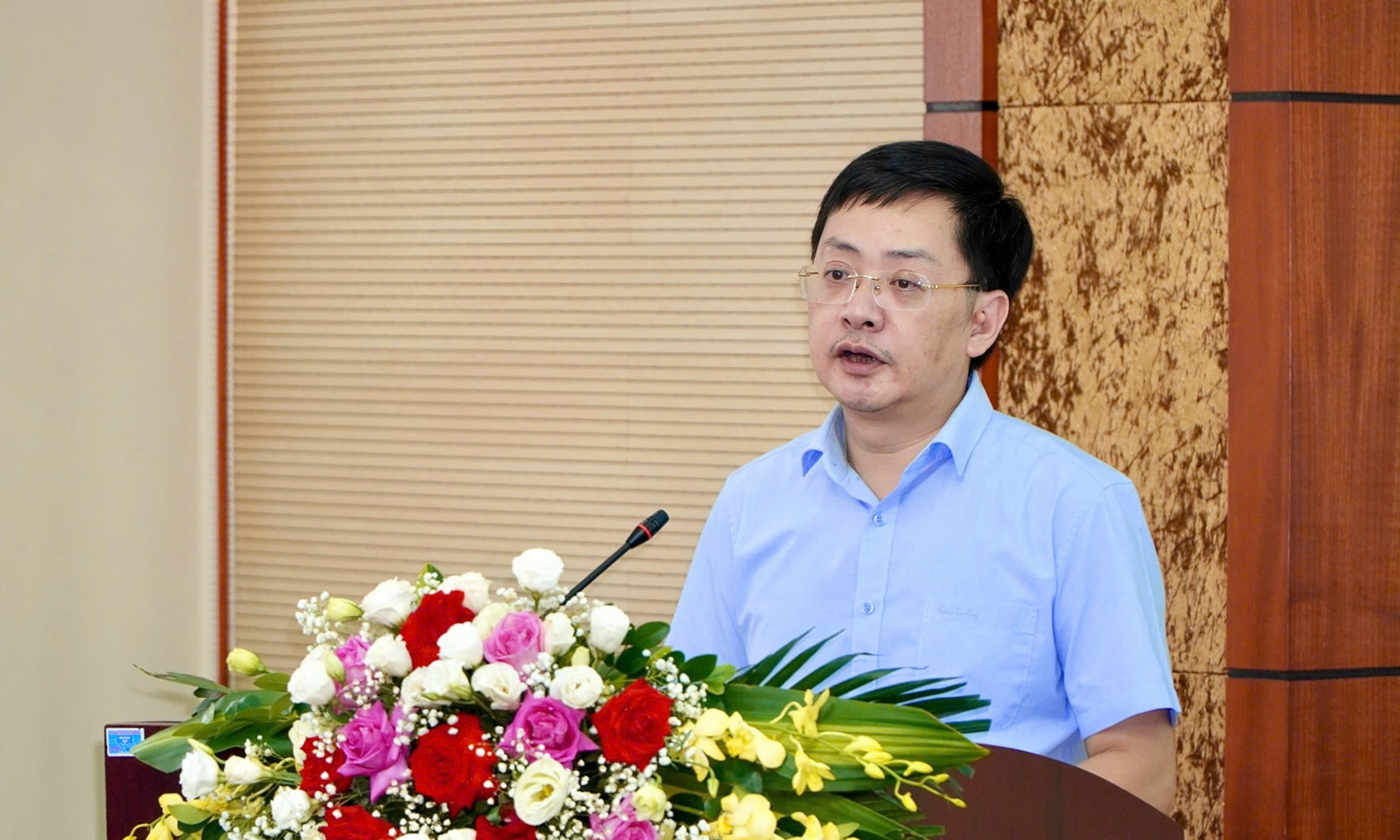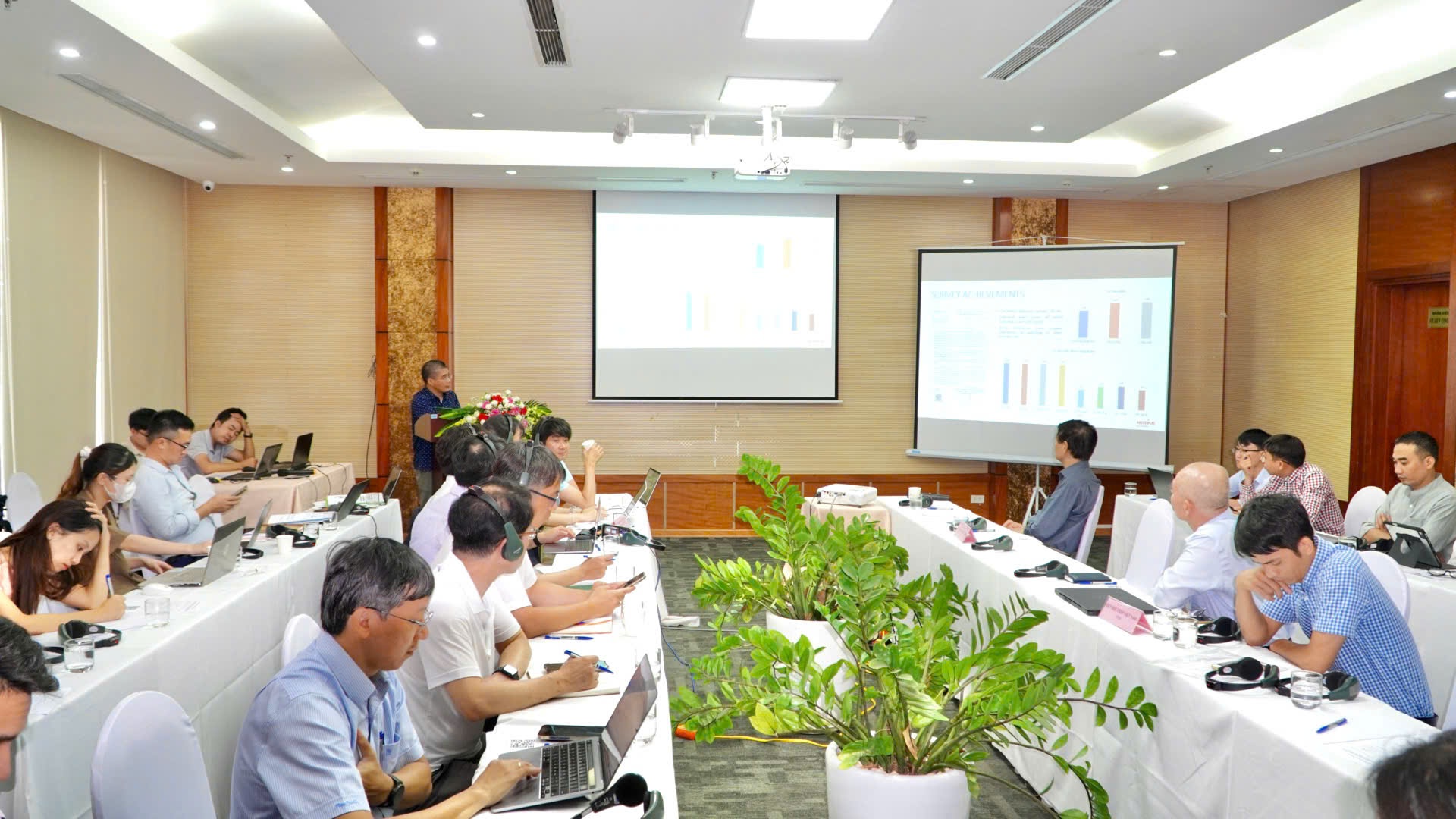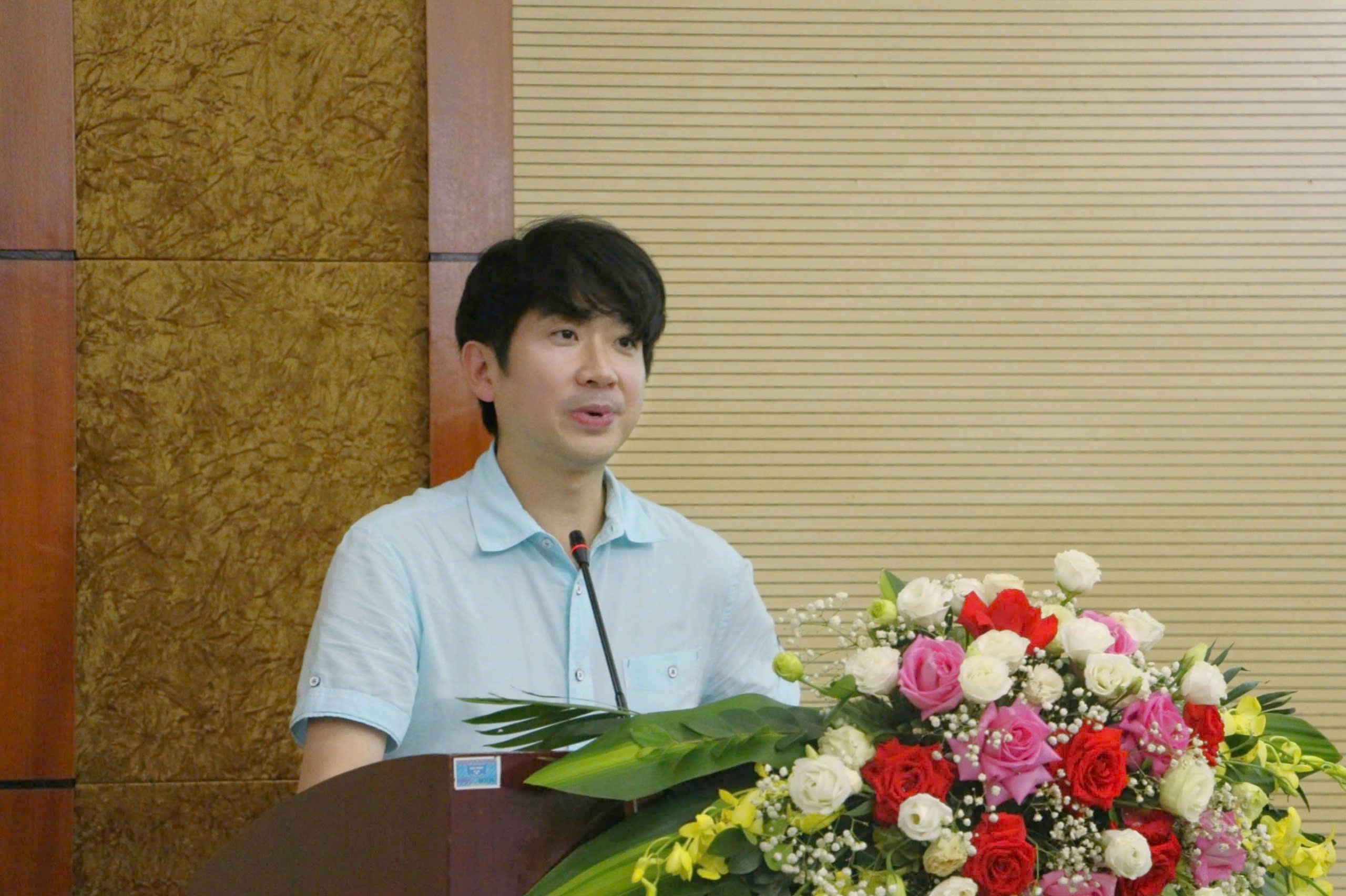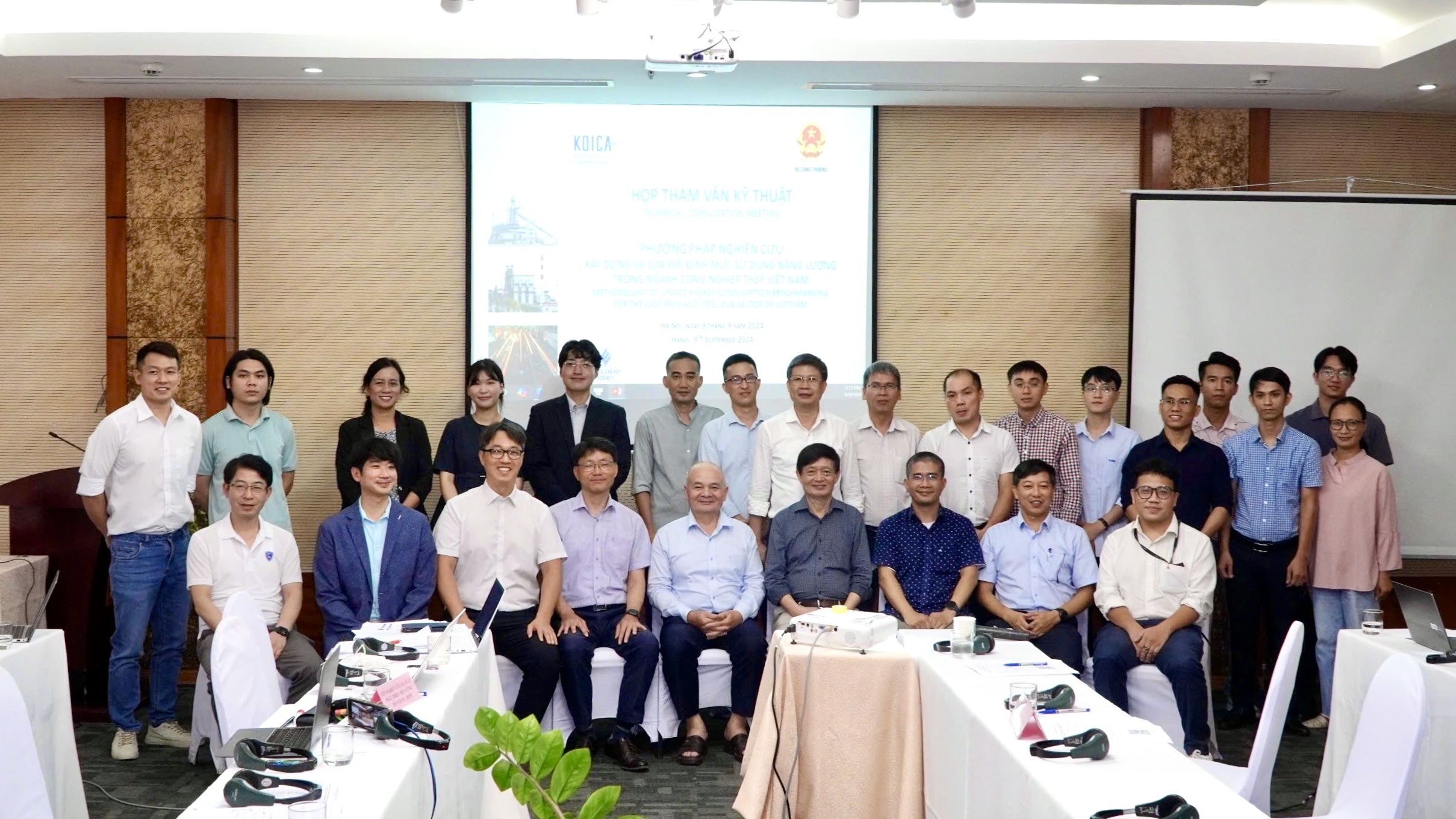The meeting was attended by representatives from the Department of Energy Efficiency and Sustainable Development of the Ministry of Industry and Trade (DEESD), experts from the Sustainable Development Management Institute of Korea (SDMI), the Vietnam Steel Association (VSA), domestic energy audit companies, steel industry enterprises, and scientists in the field of energy and energy efficiency.
In his opening remarks, Mr. Dang Hai Dung, Deputy Director of the Department of Energy Efficiency and Sustainable Development (Ministry of Industry and Trade), stated: In line with the global trend toward Net Zero compliance, Vietnam, as an exporting country, recognizes that steel is a major export product. International markets are shifting, with the European market, in particular, introducing stricter regulations for key industries such as textiles, footwear, iron, steel, aluminum, and chemicals.
Mr. Dang Hai Dung, Deputy Director of the Department of Energy Efficiency and Sustainable Development opening speeches.
Between 2011 and 2021, Vietnam's steel industry experienced significant growth, with an annual increase of 25% to 35%. By 2021, Vietnam had 117 steel manufacturers listed as key energy-consuming enterprises.
However, most steel enterprises in Vietnam are small and medium-sized, with some operating at low capacity and using outdated, energy-intensive technologies. In production facilities, energy consumption in the steel industry reaches up to 9 million tons of oil equivalent (TOE) per year. Notably, the energy consumed by the steel industry accounts for approximately 5.18% of the total energy consumption across all industrial sectors in Vietnam.
Speaking about the energy-saving vision for the steel industry, Mr. Dang Hai Dung emphasized: "The Vietnam National Energy Efficiency Programme for 2019 - 2030 (VNEEP3) sets a goal to reduce the average energy consumption in steel production. Specifically, the target for Vietnam’s steel industry is to reduce energy consumption by 3 - 10% by 2025 and by 5 - 16.5% by 2030".
After a decade of strong growth in both scale and output, the steel industry is also increasingly involved in international integration. This demands that businesses enhance energy efficiency and reduce greenhouse gas emissions. As a result, enterprises face challenges in using energy efficiently, cutting emissions, and updating energy consumption benchmarks for the steel industry in the coming period.
Energy consumption in the steel sector accounting for around 5.18% of total industrial energy use in Vietnam.
The Ministry of Industry and Trade has directed several initiatives to support enterprises in achieving energy savings to meet these targets and align with development trends in the industry.
Specifically, within the framework of the project "Promoting the Energy Efficiency and Conservtaion Investment Market in the Industrial Sector and Supporting the Implementation of the Vietnam Green Growth Action Plan," funded by the Korea International Cooperation Agency (KOICA), the Ministry of Industry and Trade collaborated in developing and revising energy usage standards for the steel industry, contributing to the enforcement of energy efficiency and conservation regulations.
The main goal of the program is to investigate, survey, and support the Ministry of Industry and Trade in issuing a new circular on energy consumption standards for the iron and steel industry for the post-2025 period (replacing Circular 20/2016/TT-BCT). Additionally, the program aims to provide valuable and useful input data, serving as a foundation for the Ministry to develop future legal documents related to energy usage.
Mr. Nguyen Thanh Ha, representative of RCEE-NIRAS, shared the objectives of the project.
At the meeting, Mr. Nguyen Thanh Ha, representative of RCEE-NIRAS stated: "Within the framework of the program, RCEE-NIRAS is collecting data, conducting surveys, and gathering on-site data. The company is also working with designated energy units (DEUs) to assess the results from energy audits and evaluate the energy-saving potential for each sub-sector of the steel industry. This will help determine how much energy can be saved, the relevant technologies, investment levels, support mechanisms, and solutions for consulting units. Finally, we will develop a report along with a draft circular, providing quantifiable indicators to supply clear data for the Ministry of Industry and Trade to use in future plans."
National and international experts presented proposals for revising energy consumption standards for the steel industry.
Both national and international experts presented proposals for revising energy consumption standards for the steel industry. They also discussed the support system for monitoring, reporting, and verifying the implementation of energy-efficient practices.
In evaluating compliance with energy consumption standards, national and international experts identified several contributing factors. The current challenges facing the steel industry include outdated, non-integrated technologies that consume large amounts of energy and cause environmental pollution; limited production capacity and product variety; low competitiveness; and reliance on market factors, imported raw materials, and trade defense measures.
| Surveys reveal that the potential for improving compliance with energy consumption standards among steel companies is significant. Specifically, 54% of companies have submitted reports, 69% have provided production information, and 70% have reported capacity data. |
Mr. Tran Duc Hoa, a representative of RCEE-NIRAS, noted: “Vietnam's steel industry currently consumes a considerable amount of energy. The energy-saving potential in the steel industry could reach up to 21%. In the 2021 list of key energy users, steel manufacturers accounted for 18.25% of the total energy consumption across all designated key energy facilities.”
Mr. Tran Duc Hoa, a representative of expert group, shares an overview of the steel industry and its energy-saving potential.
Sharing insights on energy-saving strategies in the steel industry, national and international experts also discussed the benchmarking method. Mr. Kim Min Chul, a representative from the Sustainable Development Management Institute (SDMI) of Korea, provided an overview of the benchmarking method, highlighting its energy efficiency benefits for the steel industry. He also shared successful case studies of its implementation in countries like the United States, South Korea, and Japan. Mr. Kim Min Chul noted that this method holds potential for helping Vietnam's steel industry reduce energy consumption, lower emissions, and meet the sector's energy efficiency targets.
Mr. Kim Min Chul, a representative from the Sustainable Development Management Institute (SDMI) of Korea, shares experience with benchmarking method.
At the meeting, RCEE-NIRAS also presented criteria for selecting companies and their energy audit plans for the steel industry. These criteria are classified based on production stages: sintering, ironmaking, crude steel production technologies, and finished steel production technologies. Additionally, they are categorized by capacity (low, medium, and high), year of operation (before 1996, before 2001, and up to the present), geographical location (North, Central, South—prioritizing regions with strong capabilities), ownership (state-owned, private, FDI), and willingness to cooperate.
Delegation of the meeting.
The meeting also dedicated time to clarifying the objectives, requirements, and content of the draft energy consumption standards for the steel industry. Moving forward, the Ministry of Industry and Trade will collaborate with the "Promoting Energy Efficiency and Conservation Investment in the Industrial Sector and Supporting the Implementation of Vietnam's Green Growth Action Plan" project to further develop the draft plan.
Duc Do


.jpg)
.jpg)
.jpg)







.jpg?w=367&h=206&mode=crop)


 Efficient and Economical Energy Use in Wood Production
Efficient and Economical Energy Use in Wood Production
.jpg?w=367&h=206&mode=crop) Paper Industry's Efforts to Save Energy
Paper Industry's Efforts to Save Energy
 Energy Savings at Yazaki Haiphong Vietnam Co., Ltd. – Thai Binh Branch
Energy Savings at Yazaki Haiphong Vietnam Co., Ltd. – Thai Binh Branch
 Technical Consultation on Energy Consumption Standards Revision for the Paper and Pulp Industry
Technical Consultation on Energy Consumption Standards Revision for the Paper and Pulp Industry
 Enhancing Awareness of Energy Management Systems and System Optimization
Enhancing Awareness of Energy Management Systems and System Optimization
 EOI Extension (#3): C2.2.2: Review and update for current EE benchmarking for 2 sub-industrial sectors
EOI Extension (#3): C2.2.2: Review and update for current EE benchmarking for 2 sub-industrial sectors
.jpg?w=367&h=206&mode=crop) Technical Consultation on Energy Usage Standards Amendment in the Steel Industry
Technical Consultation on Energy Usage Standards Amendment in the Steel Industry